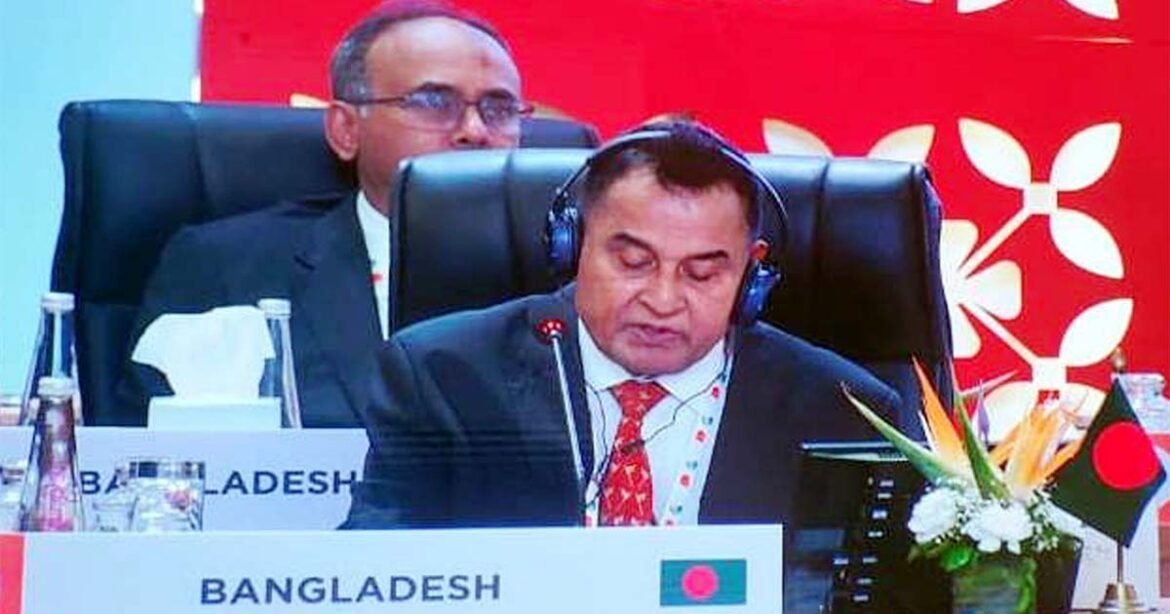As India takes the reins of the Group of Twenty (G-20) bloc during challenging times, Bangladesh finds itself in the spotlight, participating in all meetings of this prestigious forum as the invited “guest country” from South Asia.
The G-20 summit held in Gandhinagar, Gujarat, witnessed the active engagement of finance ministers and central bank governors from G-20 nations. Bangladesh, as the South Asian representative, participated in the summit via Finance Minister AHM Mustafa Kamal and Governor of Bangladesh Bank Abdur Rauf Talukdar, which is a significant distinction. Bangladesh’s participation as the only South Asian guest at the G-20 summit underscores the country’s increasing importance in global economic discussions and its remarkable achievements.
You Can Also Read: BIMSTEC Foreign Ministers Retreat: Prioritizing Crisis Response Coordination
The theme of this year’s G-20 summit, “One Earth, One Family, One Future,” sets the stage for talks about global economic cooperation and sustainable development.
In light of the ongoing global economic crisis and other pressing issues such as climate change and inequality, the G-20 summit seeks to promote international cooperation and solidarity. The theme emphasizes the importance of collective action in addressing the world’s most pressing problems and creating a brighter future for all nations.
A “Guest” at G20: A matter of great respect
Finance Minister AHM Mustafa Kamal expressed gratitude for India’s invitation to Bangladesh as a “guest country.” He acknowledged the gesture as a show of great respect from our friendly neighboring nation.
“Such an invitation from our friendly neighboring nation is indeed a matter of great respect for us,” he said.
“Participating in the G-20 is a unique opportunity for Bangladesh to be part of the global decision-making process,” the Finance Minister emphasized.
Bangladesh’s participation in the G-20 process provides a unique opportunity to participate in global decision-making procedures and resolve pressing global economic issues. The invitation reflects Bangladesh’s growing importance in the global economic landscape and its dedication to working with other countries to resolve shared challenges.
The role and opportunity of G-20
The G-20 is an international economic alliance comprised of 20 key industrialized nations, representing approximately 85 percent of global GDP, more than 75 percent of global trade, and approximately two-thirds of the world’s population. Since its formation in 1999 to address global financial crises, the G-20 has broadened its focus to include a variety of economic and development issues. The summit is conducted annually under a rotating presidency, and India is scheduled to assume the presidency from 1 December 2022 to 30 November 2023.
G20 members include Argentina, Australia, Brazil, Canada, China, France, Germany, India, Indonesia, Italy, Japan, South Korea, Mexico, Russia, Saudi Arabia, South Africa, Turkey, the United Kingdom, the United States, and the European Union.
The G-20 plays a crucial role in influencing global economic policies and coordinating international responses to financial challenges. It provides a forum for finance ministers and central bank governors to discuss global economic issues such as monetary policy, trade, investment, and financial regulation. In addition, the G-20 helps countries to engage in dialogue, share best practices, and promote international economic cooperation.
Bangladesh’s role and aspirations
Even though Bangladesh is not a formal member of the G-20, India’s invitation to Bangladesh as a “guest country” reflects its expanding economic significance on a global scale.
“After independence in 1972, our GDP was only $6.3 billion. Now, our GDP stands at $460 billion, thanks to Prime Minister Sheikh Hasina’s visionary and strong leadership,” said Finance Minister AHM Mustafa Kamal.
Bangladesh has undergone significant economic transformation over the years, emerging as a role model for development worldwide.
“It is now the 35th largest economy in the world and is projected to become the 24th largest economy by 2036,” he added.
“Our next target is to become a high-middle-income country by 2031 and a smart and developed nation by 2041. We hope that Bangladesh will soon be included as a member of the esteemed G-20 alliance,” the Finance Minister added.
G-20 membership and the path of promising future
Finance Minister AHM Mustafa Kamal expressed optimism that Bangladesh would eventually join the G-20 group, an intergovernmental forum for the finance ministries of the world’s largest economies. This goal reflects Bangladesh’s commitment to multilateralism and a balanced approach to foreign policy.
As Bangladesh engages actively with the G-20 as a “guest country,” it establishes a precedent for inclusive regional economic development and collective security in South Asia. Bangladesh plays a crucial role in shaping global economic discussions due to its commitment to sustainable development, climate action, and technology. The country’s remarkable development makes it a global development model, and it endeavors to strengthen its position in international economic cooperation.
During the two-day G-20 summit, the Finance Minister of Bangladesh highlighted the country’s remarkable economic progress and enumerated its future goals. In addition, he participated in bilateral meetings with the finance ministers of various nations in search of economic cooperation and collaboration opportunities.
Lastly, Bangladesh’s participation as the sole South Asian guest country at the G-20 summit marks a momentous occasion, showcasing its achievements and potential. As it aims to become a full-fledged member in the future, Bangladesh plays an increasingly significant role in shaping global economic discourse.


